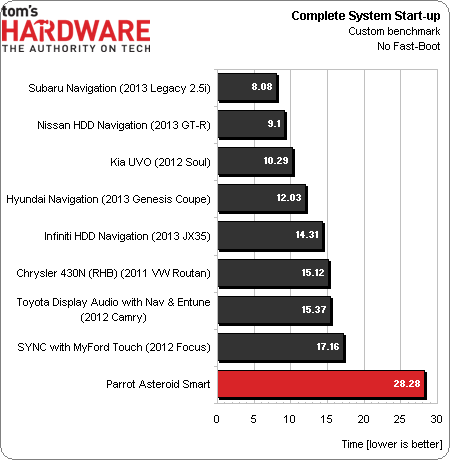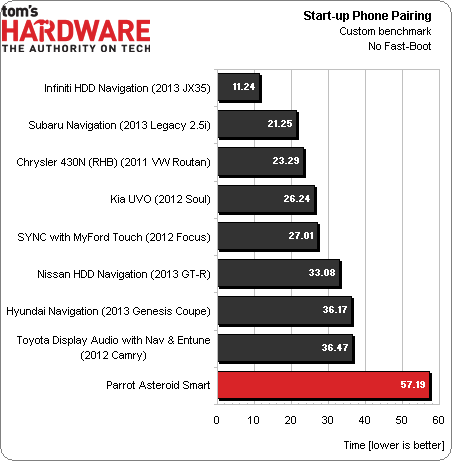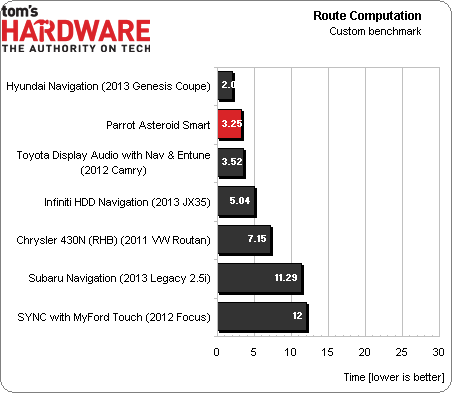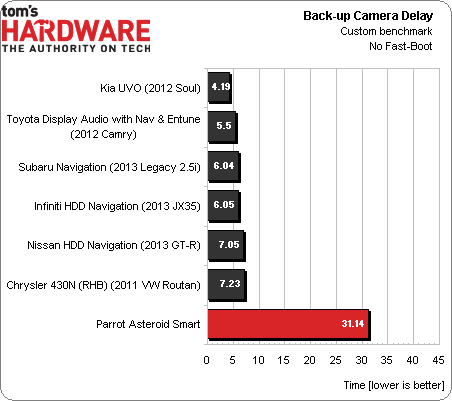Parrot Asteroid Smart Review: Android In Your Car's Dash?
Parrot combines Android 2.3 with a double-DIN head unit to create an advanced infotainment system for automotive enthusiasts. We hook it up in two difference vehicles, side-load apps, root it, and let you know whether it's worth the $600 Parrot is asking.
Results: Start-Up, Phone Pairing, Route Guidance, And Camera Delay
So much of what we do at Tom's Hardware centers on benchmark results. As such, we developed a test suite that covers some of the processes that are important to a driver using his car's technology package. The tasks we measure include: boot-up time, time to connect to a paired phone, the time it takes to start music playback after booting the infotainment system, and lastly, how long it takes to actually add a phone to the system. We chose these measurements because they affect everyday use.
We perform the tests by recording video of each action and reviewing the footage in an editor to establish the exact point the system was turned on, and when the tasks are completed. The result is accurate; these aren't stop watch-timed tests. Our results from previous car reviews are included as well.
The Asteroid Smart isn’t particularly fast, as we might have guessed from our look under the hood. It trails SYNC with MyFord Touch, previously the slowest infotainment system we've tested, by more than 10 seconds. However, we're measuring a completely cold boot that doesn't represent the real world. Parrot intelligently implements a vibration sensor that starts the boot process when the car vibrates, either from a trunk or a door opening or closing. In the case of a false trigger, the Asteroid Smart turns itself off if it doesn't receive ignition power within a minute. During our review, we didn't notice the head unit taking nearly as long to boot.
Start-up phone pairing is another area where the Asteroid Smart lags behind OEM offerings. Taking 20 seconds more than the previous last-place finisher, Parrot's solution is by no means a snappy performer. Given the boot-up measurement, however, we can't say we're surprised. Fortunately, in the 57 seconds that it takes to boot and pair up a phone, the Asteroid Smart also tethers with an available data connection automatically, too.
While we aren’t particularly fond of Parrot’s navigation software choice, we can at least say that iGo Primo is fast. The Asteroid Smart delivers the second-fastest route computation time behind the 2013 Hyundai Genesis Coupe (which incidentally employs a similar Texas Instruments-based OMAP SoC).
Finally, we have the back-up camera delay, which does not favor Parrot's Asteroid Smart. Again, though, this is both expected and understandable due to the implementation. In most OEM configurations, the camera is connected directly to the display, bypassing the infotainment system's start-up procedure. Parrot relies on a back-up camera app, which cannot launch until the system starts up. It's a limitation that we doubt an update would be able to improve much.
Get Tom's Hardware's best news and in-depth reviews, straight to your inbox.
Current page: Results: Start-Up, Phone Pairing, Route Guidance, And Camera Delay
Prev Page iGo Primo Navigation Next Page Rooting The Asteroid Smart For Maximum Potential-
Tanquen I’ve been looking for some time now to get a phone friendly head unit but they all come up lacking. You need to root them to get any real functionality and they are slow. Slow to boot and run apps with old operating systems and not all that stable. Pioneer now has AppRadio 3 but it still has issues also. Seems like such a simple thing. I just want to mirror my phone on the head units display.Reply -
woodshop Throw in at least a dual core, 1 gb ram, Android jelly bean (for Google now) and a 720p screen. Only then will people buy these head units. Or, just tape your nexus 7 to the to the glovebox and it can serve as a secondary airbag.Reply -
flong777 It is interesting to see this third party hardware to update vehicles without computer touch screens but after reading the article, it doesn't seem worth the trouble. Even if you do a great job of installation your left with a buggy system and a mediocre GPS. It appears that third party updates like this one need to grow up some.Reply
What is the real deal killer is the mediocre audio - you would have thought that they could have gotten this right as the technology for quality audio has been around for at least 15 years. -
Bloodire $100 tablet and $70 software. Bang! touchscreen on your car. Oh and whatever is costs you to mount the tablet.Reply -
daekar Why would I want to put something like this in my car when I and everyone I know has a smartphone? I just place my phone on the dash when I want nav, and I usually don't even bother taking calls while driving. If I did, I'd use a Bluetooth headset. Besides, lots of people keep cars far longer than they keep phones. 7 years from now, do you really think that this device will be able to keep up? The whole touchscreen control nav console infotainment thing is completely impractical. Take away controls with tactile feedback. Replace with a screen with almost no feedback at best. Add proprietary software and a dash of obsolescence. I just don't see it.Reply -
tuanies Reply11128834 said:Throw in at least a dual core, 1 gb ram, Android jelly bean (for Google now) and a 720p screen. Only then will people buy these head units. Or, just tape your nexus 7 to the to the glovebox and it can serve as a secondary airbag.
You can do that but it won't look as nice nor would your steering wheel controls work.
11129463 said:It is interesting to see this third party hardware to update vehicles without computer touch screens but after reading the article, it doesn't seem worth the trouble. Even if you do a great job of installation your left with a buggy system and a mediocre GPS. It appears that third party updates like this one need to grow up some.
What is the real deal killer is the mediocre audio - you would have thought that they could have gotten this right as the technology for quality audio has been around for at least 15 years.
The audio quality is fine, just the function is lacking. I believe they have TomTom on the Asteroid Market now too for those that dislike iGo.
11129722 said:$100 tablet and $70 software. Bang! touchscreen on your car. Oh and whatever is costs you to mount the tablet.
Will not look as nice though.
11130207 said:Why would I want to put something like this in my car when I and everyone I know has a smartphone? I just place my phone on the dash when I want nav, and I usually don't even bother taking calls while driving. If I did, I'd use a Bluetooth headset. Besides, lots of people keep cars far longer than they keep phones. 7 years from now, do you really think that this device will be able to keep up? The whole touchscreen control nav console infotainment thing is completely impractical. Take away controls with tactile feedback. Replace with a screen with almost no feedback at best. Add proprietary software and a dash of obsolescence. I just don't see it.
Some people want a clean look that doesn't require slapping their phone on the dash or just want an upgrade from the plane factory setup, maybe an old factory navigation setup. The removal of tactile feedback and controls are typically with cheaper cars, the luxury vehicles still have buttons. But 7-years down the road, you could probably replace this Parrot with a 4th or 5th generation unit :).
-
tuanies Reply11130452 said:Now I find myself wondering what software Bloodire is talking about...
He's probably talking about GPS software, ie TomTom or Garmin -
brazuka331 Add a place for me to put a SIM card for its on data and full Google Play store support and i'll buy it! Why is it so hard for these companies to make what seems so simple! We want an in-dash and works like a tablet with full android and not your sh**ty bloatware!Reply



